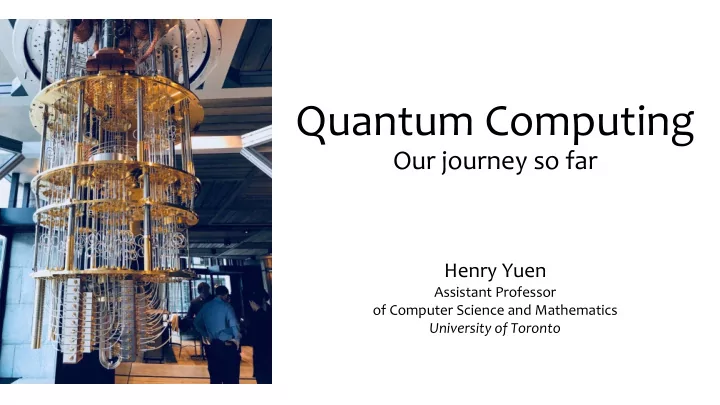

Quantum Computing Our journey so far Henry Yuen Assistant Professor of Computer Science and Mathematics University of Toronto
Quantum mechanics is weird Uncertainty principle Wave/particle duality Superposition
Quantum mechanics governs everything from the mundane… Photosynthesis Protein folding Superconductivity Superfluidity …to exotic physical phenomena
Richard Feynman (1982): Q : Can a computer simulate this? A : Not very easily!
0 1 Bit Classical computer
0 1 Classical computer Classical bit 0 1 0 0 1 1
Qubit
0 Qubit
Qubit
1 Qubit
Qubit
Qubit
Qubit
Qubit
0
1 0
3 qubits: requires 8x3 = 24 classical bits N qubits: requires at least 2 N classical bits! 1 0 The whole is greater than the sum of its parts!
We need a new kind of computer!
What can a quantum computer do?
Simulating quantum physics, of course!
Example: Artificial nitrogen fixation for fertilizer production (i.e. Haber process) Consumes > 1% of world’s energy output. Quantum computers could speed up • finding more efficient reaction pathways • develop exotic materials • drug design
P = 15904 Q = 93520 P × Q = 1487342080
P = 17449 Q = 34253 P × Q = 597680597
Peter Shor (1994): quantum computers can factor large numbers very quickly! 1977 – 1994 RSA 1977 - 1994 Diffie- Hellman
Crossroads Since Shor’s algorithm, physicists and computer scientists have been faced with three options: 1. Quantum mechanics is wrong. 2. There is a fast classical algorithm for factoring. 3. Quantum computers are more powerful than classical computers. At least one of these must be true!
Public Service Announcement
Myth: Quantum computers solve things by trying every possibility at once.
Fact: Quantum computers can solve certain types of problems faster via interference patterns .
Myth: Quantum computers can solve the traveling salesman problem quickly.
Fact: Quantum computers probably cannot solve TSP quickly.
Quantum computing today
The big questions • How will we scale up quantum computers to millions of qubits? • Are small-scale, rudimentary quantum computers useful for anything? • What kinds of problems are quantum computers good at solving? • What can quantum computing tell us about nature?
Quantum Machine Learning? ML for quantum data ML for classical data
Chemistry Mathematics Chemical dynamics Quantum chemistry simulations Engineering Operator algebras Fermionic encoding methods Representation theory Statistics Key distribution Quantum networks Number theory Quantum enhanced sensing Algebraic geometry Quantum Computing Information theory Condensed Matter Complexity theory Physics Machine learning Quantum gravity Cryptography Algorithms String theory Quantum Field Theory Physics Optimization Computer Science
We’re in the early days of quantum computing. Uncharted territory = Thanks!
Recommend
More recommend